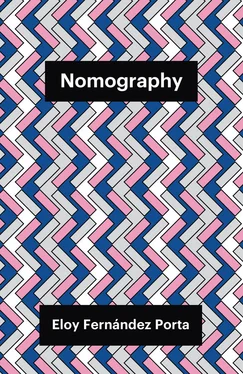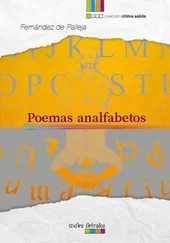1 Cover
2 Series Page Theory Redux series Series editor: Laurent de Sutter Published Titles Mark Alizart, Cryptocommunism Armen Avanessian, Future Metaphysics Franco Berardi, The Second Coming Alfie Bown, The Playstation Dreamworld Laurent de Sutter, Narcocapitalism Roberto Esposito, Persons and Things Graham Harman, Immaterialism Helen Hester, Xenofeminism Srećko Horvat, The Radicality of Love Dominic Pettman, Infinite Distraction Eloy Fernández Porta, Nomography Nick Srnicek, Platform Capitalism
3 Title Page Nomography On the Invention of Norms Considered as One of the Fine Arts Eloy Fernández Porta Translated by Ramsey McGlazer polity
4 Copyright Copyright © Eloy Fernández Porta, 2021 This English edition © Polity Press, 2021 Polity Press 65 Bridge Street Cambridge CB2 1UR, UK Polity Press 101 Station Landing Suite 300 Medford, MA 02155, USA All rights reserved. Except for the quotation of short passages for the purpose of criticism and review, no part of this publication may be reproduced, stored in a retrieval system or transmitted, in any form or by any means, electronic, mechanical, photocopying, recording or otherwise, without the prior permission of the publisher. ISBN-13: 978-1-5095-4396-0 A catalogue record for this book is available from the British Library. The publisher has used its best endeavours to ensure that the URLs for external websites referred to in this book are correct and active at the time of going to press. However, the publisher has no responsibility for the websites and can make no guarantee that a site will remain live or that the content is or will remain appropriate. Every effort has been made to trace all copyright holders, but if any have been overlooked the publisher will be pleased to include any necessary credits in any subsequent reprint or edition. For further information on Polity, visit our website: politybooks.com
5 Translator’s Note Translator’s Note Throughout this book, Eloy Fernández Porta uses words and phrases in English. These are often taken from the lexicons of corporate culture or the internet; at other times, they point to Porta’s engagement with Anglophone media or index his fluency in the lingua franca of the global art market or the fashion industry. So the reader of the Spanish original comes across references to “infotainment,” the “smartphone,” the “foodie,” and the “fanbase,” to “outsider” art, the “mainstream,” “normcore,” “chaos magic,” and the “unwearable.” This reader is likewise told, in English, to “Enjoy!,” to “Eat well,” to “Do it yourself,” and even, when the author briefly becomes a “cheerleader,” to “Give me an L! Give me an A! Give me a W!,” to spell, “ (All together!) LAAAW!” As that last example indicates, Porta’s English is often parodic, playful, ironic, or absurd. Anglicisms comically interrupt his sinuous Spanish sentences, or they grate jarringly against the words in their immediate vicinity, to ludic effect. They are like bits of ad copy introduced into an otherwise elegant critical discourse, or Doritos served in a dish made by a chef who specializes in haute cuisine . The effects of Porta’s use of other foreign languages – French to signal sophistication, Latin to send us all to mass or to court – can be captured or at least closely approximated in translation. But there is unfortunately no way to do justice to the author’s use of English in a rendering of his text in English. “There is no remedy to which translation could have recourse here,” Jacques Derrida writes of the “foreign effect” of foreign words used in another context: “No one is to blame; moreover, there is nothing to bring before the bar of translation.” 1 Something could have been brought before the bar, of course: the italicization of words and phrases that appeared in English in the original, for instance. But this would have risked confusion, since throughout the text Porta uses italics to other ends. I have therefore left these words and phrases unmarked, although this means domesticating Porta’s prose, depriving it of some of its multilingual richness and polyphonic playfulness. All references to brand names, fashion designers, films, television programs, musicians, and YouTube sensations have also been retained, even when these might not be familiar to readers of the English. I trust that this will not prevent these readers from complying with Porta’s injunction to “Enjoy!”
Notes Notes 1 1. Jacques Derrida, “Shibboleth: For Paul Celan,” trans. Joshua Wilner and Thomas Dutoit, in Sovereignties in Question: The Poetics of Paul Celan, ed. Thomas Dutoit and Outi Pasanen, New York: Fordham University Press, 2005, 30.
6 Grey Alert, Blue Pill Notes
7 The Nomographic ImaginationCreativity and Liberalism What’s Done Is Law Enjoy! On the Tempered Passions Do It Yourself: Taxonomy and Hierarchy Notes
8 Why Do They Call It “Sex” When They Mean “the Ethical Dimension of the Doctrine of Relation”?Nomography and Personal Relations Are You Sure I’m Normal? The Postcoital Selfie and the End of History The Potentials of the Flesh Be Courteous, Please, or I’ll Smash Your Face In Notes
9 No One’s Style On Cowardice The Arbiter of Elegance and the Video Assistant Referee Notes
10 Desigual, or Difference Notes
11 On the Norm Considered as One of the Fine Arts Exodus 34:29: The Cheerleader Patriarch What is an Artist, and Why Does the Artist Always Seem to Ask for the Slaps Not Received in Childhood? What Is a “Provocation”? The Museum and the National Bureau of Norms There Is No Institution But You I Am Myself and My Prohibitions On the Norm Considered as One of the Applied Arts, or The Adventures of a Gastronaut and an Epicurean Don’t Fuck. Eat Well. Notes
12 End User License Agreement
1 No One’s StyleCristóbal Fortúnez, Fauna mongola , 2010.Amina Bouajila, Illustration for Elephant , nº35, Summer 2018 ...
2 On the Norm Considered as One of the Fine ArtsAlice Framis, The Room of Forbidden Books , 2004 (© Blueproject ...
1 Cover
2 Table of Contents
3 Series Page Theory Redux series Series editor: Laurent de Sutter Published Titles Mark Alizart, Cryptocommunism Armen Avanessian, Future Metaphysics Franco Berardi, The Second Coming Alfie Bown, The Playstation Dreamworld Laurent de Sutter, Narcocapitalism Roberto Esposito, Persons and Things Graham Harman, Immaterialism Helen Hester, Xenofeminism Srećko Horvat, The Radicality of Love Dominic Pettman, Infinite Distraction Eloy Fernández Porta, Nomography Nick Srnicek, Platform Capitalism
4 Title Page Nomography On the Invention of Norms Considered as One of the Fine Arts Eloy Fernández Porta Translated by Ramsey McGlazer polity
5 Copyright Copyright © Eloy Fernández Porta, 2021 This English edition © Polity Press, 2021 Polity Press 65 Bridge Street Cambridge CB2 1UR, UK Polity Press 101 Station Landing Suite 300 Medford, MA 02155, USA All rights reserved. Except for the quotation of short passages for the purpose of criticism and review, no part of this publication may be reproduced, stored in a retrieval system or transmitted, in any form or by any means, electronic, mechanical, photocopying, recording or otherwise, without the prior permission of the publisher. ISBN-13: 978-1-5095-4396-0 A catalogue record for this book is available from the British Library. The publisher has used its best endeavours to ensure that the URLs for external websites referred to in this book are correct and active at the time of going to press. However, the publisher has no responsibility for the websites and can make no guarantee that a site will remain live or that the content is or will remain appropriate. Every effort has been made to trace all copyright holders, but if any have been overlooked the publisher will be pleased to include any necessary credits in any subsequent reprint or edition. For further information on Polity, visit our website: politybooks.com
Читать дальше












